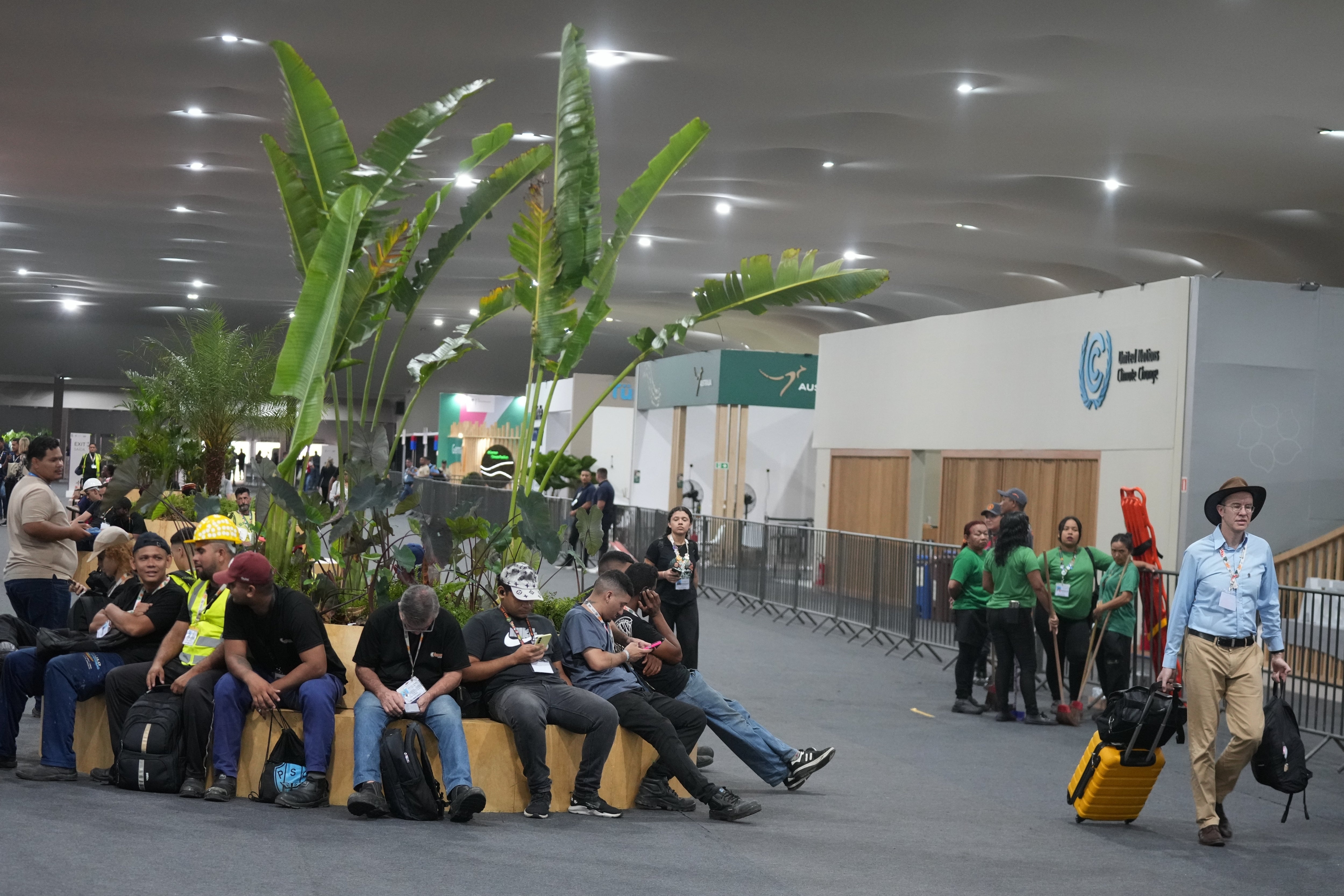- Climate
Multilateralism survived another year at Cop30 in Brazil - but the outcome was far below the level of ambition that is needed to address the climate crisis
Saturday 22 November 2025 22:18 GMTComments
 CloseInside Greenpeace's legendary Rainbow Warrior ship at COP30 in Brazil
CloseInside Greenpeace's legendary Rainbow Warrior ship at COP30 in Brazil
Sign up to the Independent Climate email for the latest advice on saving the planet
Get our free Climate email
Get our free Climate email
 Email*SIGN UP
Email*SIGN UPI would like to be emailed about offers, events and updates from The Independent. Read our Privacy notice
Symbolism was everywhere as Brazil’s Cop30 drew to a close. First, there was the Africa Pavillion dramatically bursting into flames on Thursday afternoon, which - along with the daily bursts of Amazonian rainfall that flooded a number of meeting rooms over the two weeks - gave the impression that climate-induced extreme weather was right there in the room with us in Belém.
Then, there was the news that, after much squabbling between the two countries, the next UN climate conference, Cop31, is set to be hosted by the Australian government in the Turkish city resort of Anatalya, with a pre-Cop world leaders’ summit set to be held on a Pacific island. Quite how this will all pan out is anyone’s guess at this stage - but the decision reflects something of just how hard countries seem to be finding it to agree on anything at the moment.
Nearly a full day after Cop30 was supposed to finish - and several hours after two massive cruise ships hosting national delegations departed from Belém - the final decision document set to drive climate policy back home, or “Global Mutirão” as it is being called here, was released by the Brazilian Presidency. As ever with UN climate conferences, it was a compromise - but one that seemed to be defined by a resignation of ambition, rather than an attempt at genuine trade-offs.
At the heart of the outcome was a failure from rich countries - grappling as they are with weakening political consensus around climate, and cuts to aid budgets - to commit to a target to triple aid available for poorer countries to adapt to climate change by 2030. Instead, the deadline has been pushed back to 2035, while it is to be part of an existing promise to deliver $300bn in climate finance agreed to last year, rather than additional finance, which is what the world’s least developed countries have been asking for.
.png) open image in galleryThe symbolism was hard to escape when part of the conference site burst into flames on thursday (Kevin Munyoli)
open image in galleryThe symbolism was hard to escape when part of the conference site burst into flames on thursday (Kevin Munyoli)Meanwhile, the promise of a roadmap to assist countries move away from fossil fuels - which had been backed by Brazil’s President Lula at the opening of Cop30 - failed to appear in the text following intense lobbying from Saudi Arabia and others. The language calling for improved interim emissions targets, which the UN said ahead of Cop30 would only reduce emissions by around 10 per cent by 2035, was also notably weak.
Parties worked on the agreement throughout the night, and negotiators appeared exhausted as they gathered for the final plenary in Belém. “I was there the entire night, and we came to an agreement at 8AM this morning,” Emmanuel Yarkpawolo, chief negotiator for Liberia, told The Independent. “There are some outcomes that are good… It shows us that multilateralism is still working, and the Paris Agreement is working. Without it, the planet will be in a very bad condition.”
As Yarkpawolo attests, reaching any sort of deal is an achievement, given how far apart countries have been. But it is undeniable that Cop30 has failed to meet the twin challenges of closing the gap in ambition on decarbonisation, as well as boosting the amount of money available for poorer countries as climate impacts escalate.
“Cop30 was a failure for the communities on the frontlines of the climate crisis,” said Debbie Hillier, UNFCCC policy lead at the NGO Mercy Corps. “Ten years after the Paris Agreement — in what was meant to be the “implementation COP” — leaders left Belém, Brazil, without the commitments needed to protect people already living with the devastating consequences of climate change.
“Adaptation finance is not abstract,” she continued. “It determines whether farmers can protect their crops, whether coastal communities can reinforce shorelines, whether health systems can withstand climate-related disease outbreaks, and whether countries can build resilience rather than lose hard-won development gains.”
Mohamed Adow, director of Nairobi-based think tank Power Shift Africa, described Cop30 as “baby steps in the right direction” - but added that “keeping the process alive alone will not cool the planet”. Sol Oyuela, from WaterAid, said that the ambition in the wider package agreed to in Belém ultimately “fails those most impacted by climate change”.
 open image in galleryAn attendee of Cop30 arrived at the conference hall with his luggage as negotiations continued on Saturday (Copyright 2025 The Associated Press. All rights reserved.)
open image in galleryAn attendee of Cop30 arrived at the conference hall with his luggage as negotiations continued on Saturday (Copyright 2025 The Associated Press. All rights reserved.)At the closing plenary on Saturday, with Amazonian rain echoing through the hall, there was serious disquiet among delegates around Brazil’s management of the process, with complaints around transparency of proceedings and concerns that some countries were being ignored.
But more broadly in Belém, there has been a sense that these talks have floundered due to a failure of other powerful pro-climate countries to take on a leadership role.
The EU, distracted by the war in Ukraine as well as the rise of the populist right, was not the moral authority it has previously been. The UK, with a weak government and Budget on the horizon, arguably failed to live up to its former climate mantle - while the Prime Minister of Canada Mark Carney, formerly one of the world’s foremost climate champion when Governor of the Bank of England, formally launched plans to double the country’s liquefied natural gas (LNG) export capacity in the middle of Cop.
The US - which has traditionally been the country best able to exert pressure on key blocker Saudi Arabia - was of course completely absent from the conference, while hopes that China, the world’s biggest emitter and by far the world’s biggest producer of renewable technology, would take up a climate leadership mantle at the summit failed to materialise.
“China has been under very little pressure in negotiating rooms at Cop30, which is largely the result of an absent US and fragmented EU,” Kate Logan, who has been following negotiations closely for the Asia Society Policy Institute, told The Independent. “Officials see little incentive to actively push ambition, especially as they can point to China’s leadership in bringing down the cost of clean technologies globally.”
China, the EU and the rest of the world’s great powers can continue to hash climate out year after year at UN climate conferences, but as the clock keeps ticking towards irreversible climate breakdown, it is the world’s least developed countries who are set to suffer more and more.
“The Cop process may be in need of some reform,” acknowledged Mohamed Adow to The Independent after the publication of the final outcome. “The need for unanimous voting means that all it takes is for one country to veto progress, which gives undue power to the fossil fuel nations to block changes.
“Thankfully we can still find some solace in the fact that in the real world, clean energy technology is still advancing at speed, and the benefits of wind and solar are being embraced at rapid scale.”
This article was produced as part of The Independent’s Rethinking Global Aid project
More about
Cop30BrazilUSEUUNChinaRethinking Global AidJoin our commenting forum
Join thought-provoking conversations, follow other Independent readers and see their replies
Comments

